Meet 2 companies keeping Malaysia on the world map as a leading semiconductor hub
[This is a sponsored article with MDEC.]
Did you know that Malaysia is consistently placed among the top 10 leading countries in semiconductor manufacturing? In 2023 alone, approximately 35.23 billion semiconductors were produced here.
Malaysia’s semiconductor industry is projected to continue its growth trajectory, with a compound annual growth rate (CAGR) of 7%. According to a report by Eastspring Investments and PwC Singapore, this growth is expected to propel the industry to reach an output of US$46 billion or RM212.52 billion by 2028.
More than 50 years since the first Free Trade Zone in 1972, the semiconductors sector still remains an electrified industry in Malaysia. This has put Malaysia on the global map as an electrical and electronics (E&E) and semiconductor industry powerhouse—which convinced Tesla to set up shop here.
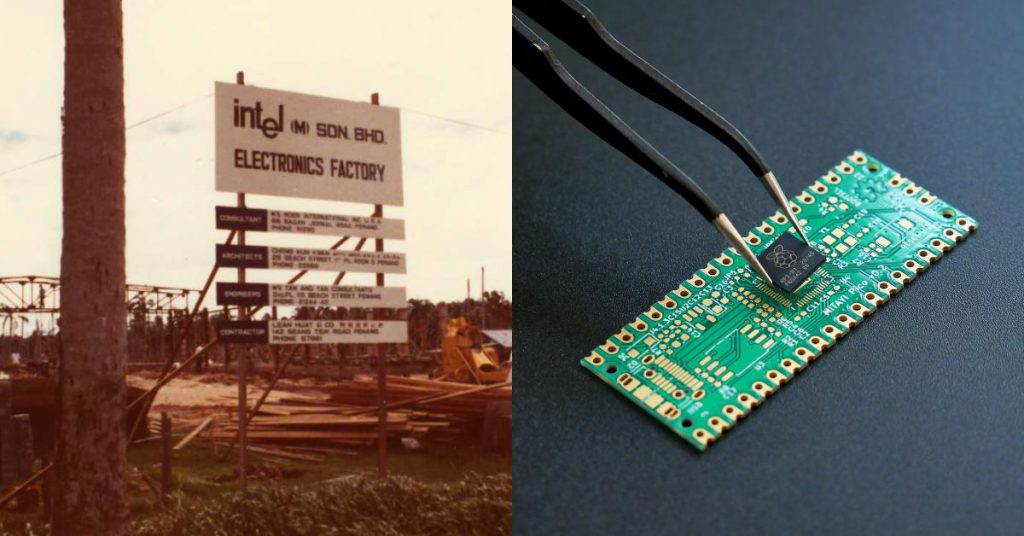
As reported by Forbes Asia in its 200 Best Under a Billion 2023, demand for semiconductors has skyrocketed in the past three years, accelerated by the adoption of AI.
In collaboration with MDEC, we had the opportunity to interview two notable founders in the industry, Dato’ Seri Tan Eng Kee, Chief Executive Officer of Greatech Technology Berhad, and Chuah Choon Bin, Executive Chairman of Pentamaster Corporation Berhad.
They shed light on the roles their respective companies have played in contributing to our current standing, and where they see the sector growing from here.
Greatech Technology Berhad (Greatech)
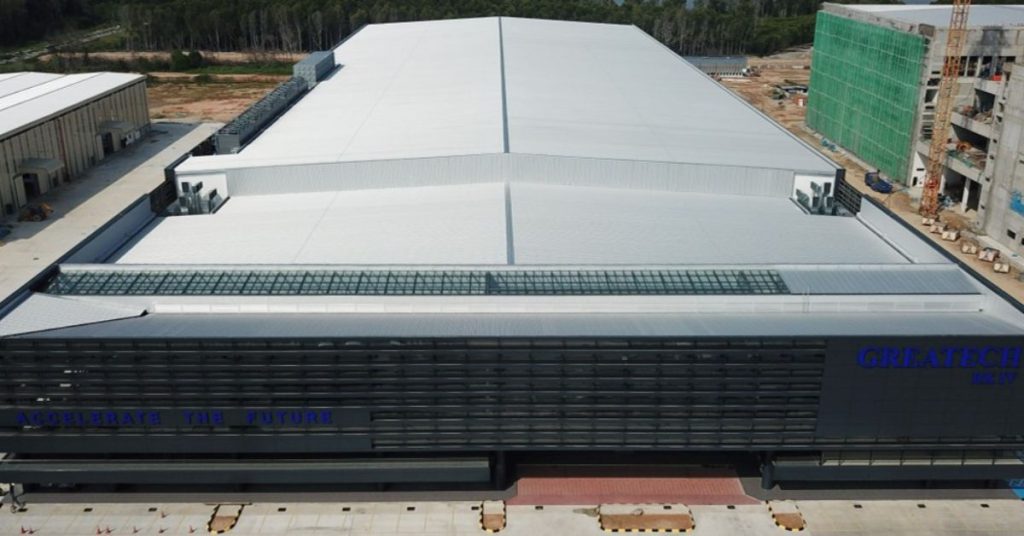
Greatech has been part of multiple Forbes Asia’s Best Under a Billion lists, recording US$116.2 million in revenue in 2022, with that figure rising to US$140.2 million in 2023.
The company’s products range from single automated equipment (SAE) to production line systems (PLS), which can be customised to the requirements of customers.
Did you know: An SAE is used in semiconductor manufacturing to perform one specific function precisely, such as ensuring accuracy and consistency in the production process.
Meanwhile, a PLS contains both hardware and software. It receives commands from either an automated system or a human operator and then sends those commands to its actuators, which make things happen.
Greatech’s history dates back to 1997 in Bayan Lepas, Penang, with Dato’ Seri EK Tan’s vision of manufacturing semi-automated and automated equipment for the consumer electronics sector. More specifically, hard disk drives.
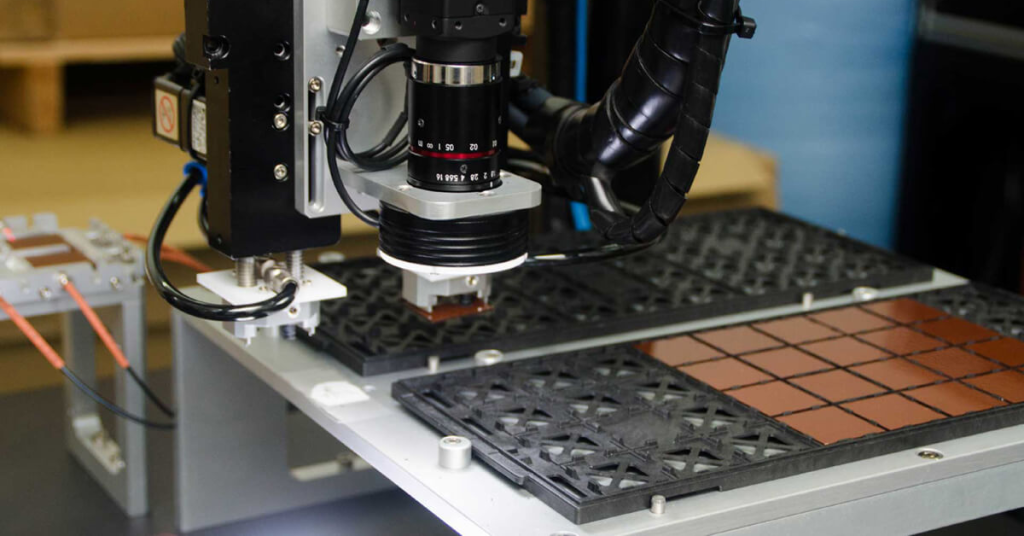
It was timely, as there were several government initiatives to foster the company’s growth. These included various tax incentives, grants, and streamlined regulatory processes to support both domestic and foreign direct investments in the country.
Malaysia’s local workforce also posed an opportunity, with its people able to offer different skills to the evolving business landscape.
Dato’ Seri EK Tan told Vulcan Post that Greatech today stands tall with a workforce of 1,500 employees, 97% of which are Malaysian. “Driving innovation forward are the 600 design engineers who continuously push the boundaries of what’s possible,” he acknowledged.

Dato’ Seri EK Tan proudly expressed that his company’s stronghold is its continuous tech innovation.
“We invest heavily in research and development (R&D) to stay ahead of the curve, consistently introducing cutting-edge solutions and advancements in factory automation,” he stated.
Not only does Greatech manufacture these solutions, but its factory’s equipment also utilises Internet of Things (IoT) devices to gather data and improve product functionality and efficiency. Additionally, the team integrates AI and machine learning algorithms to optimise their manufacturing operations.
Founder insights
- Do hard things. The ones that would challenge you to be better. You will gain experience, courage and skills to do bigger and harder things.
- There are no shortcuts to success. Weather the challenges and approach life with a sense of curiosity and always striving to learn and grow.
- Understand your products, your customers’ needs and desires. Focus on a few things and do them well.
Dato’ Seri EK Tan, Co-founder & CEO of Greatech Technology Berhad
Pentamaster Corporation Berhad (Pentamaster)
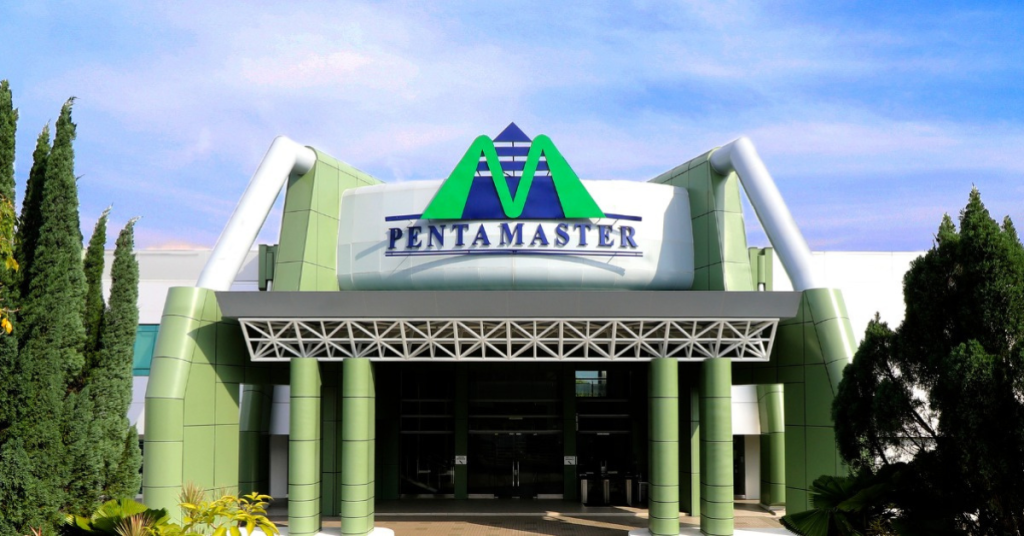
Pentamaster ranked fifth in the Forbes Asia’s Best Under A Billion 2020 list, recording US$118 million in sales, US$20 million in net income, and a market value of US$629 million.
In 1991, Chuah Choon Bin founded Pentamaster in Penang after leaving Intel, where he worked as an automation engineer alongside his brother-in-law.
“At that time, we saw great opportunity and potential in the automation sector with the mushrooming of manufacturing companies in Penang,” Chuah told Vulcan Post.
“Most of the manufacturing equipment or factory automation solutions were imported, hence there were growing needs for local automation solutions that were more cost-saving during that time.”
Pentamaster greatly benefited from the developing manufacturing scene in the 1990s, and the supportive regulatory environment for industrial automation.
In fact, Chuah cited the 1997 financial crisis as a turning point during Pentamaster’s early days due to the increased demand for automation that could better save company costs.
Since then, Pentamaster has continued to grow, diversifying its business portfolio not only in the automation manufacturing industry but also in the dynamic and ever-evolving Malaysian market.
Currently, Pentamaster has a few main business portfolios, namely automated test equipment, factory automation solutions, and medical device automation technology.
Pentamaster continuously invests in R&D to innovate automation solutions. “It’s essential to maintain a mindset of continuous improvement, always seeking to push beyond current boundaries, and embracing the challenges inherent in innovation,” Chuah believes.
Founder insights
I firmly believe that cultivating a determined mindset is essential for success in the entrepreneurial journey, a principle that applies to all entrepreneurs. When you establish a clear vision of your goals, coupled with unwavering dedication and perseverance, you pave the way for significant breakthroughs.
As an entrepreneur, envisioning the future of your startup is paramount. Beyond its inception, assembling a solid core team becomes crucial for sustaining and propelling growth to new heights. Your core team serves as the cornerstone for achieving substantial expansion.
Chuah Choon Bin, Executive Chairman of Pentamaster Corporation Berhad
Growing in the automation era
With companies worldwide shifting to adopt automation for enhanced efficiency and cost optimisation, both Greatech and Pentamaster appear well-positioned to capitalise on this trend.
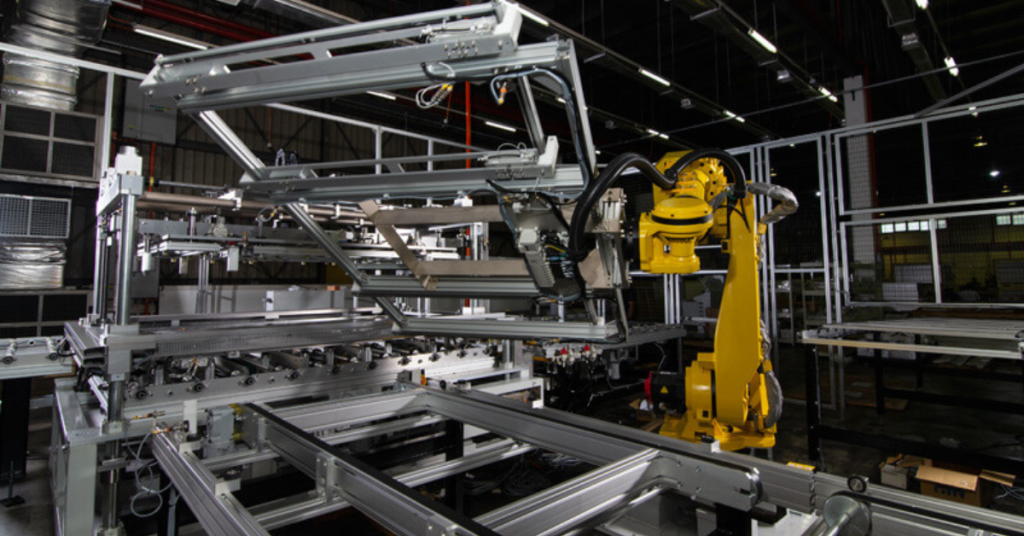
This is backed by Prime Minister Datuk Seri Anwar Ibrahim’s visit to Greatech’s Penang factory in February 2024.
There, they highlighted that Greatech produced important machines to manufacture high-tech products such as electric vehicle (EV) batteries, solar panels, and AI boards for top global tech companies.
Ultimately, Dato’ Seri EK Tan stated that Malaysia’s strong foothold in the E&E industry provides a valuable foundation for the automation sector, which Chuah acknowledged too.
Greatech and Pentamaster are just two examples of companies under MDEC’s Digital Exports Division (DEX), supporting and enabling companies to expand deeper into regional and global markets.
DEX is part of the GAIN (Gateway, Amplification, Investment, and Nurture) programme, which aims to enhance trade opportunities for local tech companies on a global scale.
MDEC facilitates this by collaborating extensively with the Malaysia External Trade Development Corporation (MATRADE) and the Ministry of Foreign Affairs via the Malaysian embassies, which you can read about here.
One example of such networking programmes can be seen through the upcoming SEMICON Southeast Asia (SEMICON SEA), happening at MITEC, Kuala Lumpur on May 28-30, 2024.
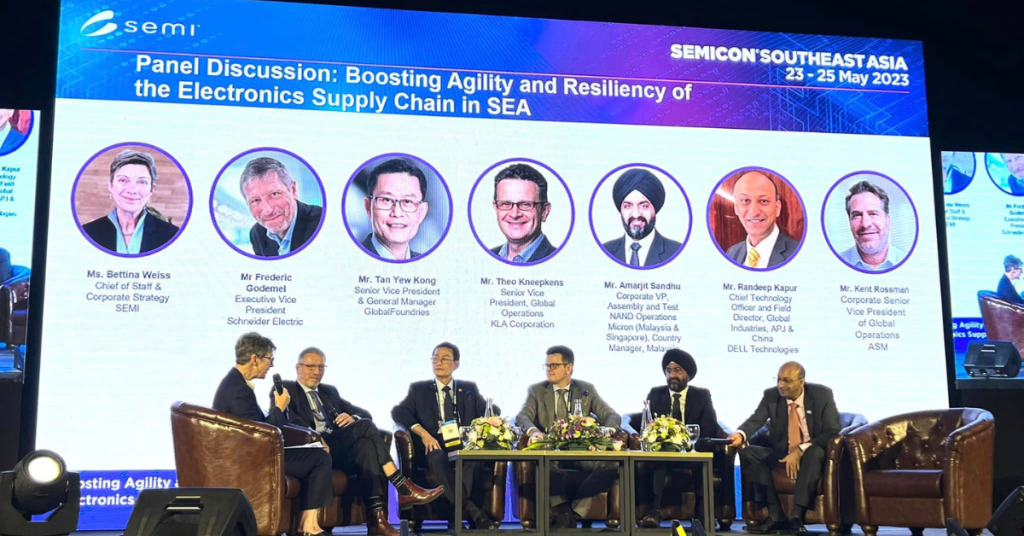
The exhibition is where decision-makers in the E&E industry will be connected to share about and demonstrate their tech advancements around Southeast Asia.
This is crucial for the nation, as global companies serve as the backbone of a vibrant economy, catalysing innovation, generating employment, and nurturing talent to grow Malaysia’s business ecosystem.
Also Read: Malaysia’s quest for 5 unicorns by 2025 is now in the hands of MDEC’s game plan
Featured Image Credit: Malaysia Digital Economy Corporation (MDEC) hosted a luncheon attended by the Minister of Digital, YB Tuan Gobind Singh Deo alongside MDEC Digital Export’s GAIN (Gateway, Amplification, Investment and Nurture) programme portfolio companies
Lazada settles Singapore layoffs as Alibaba invest another $310 million
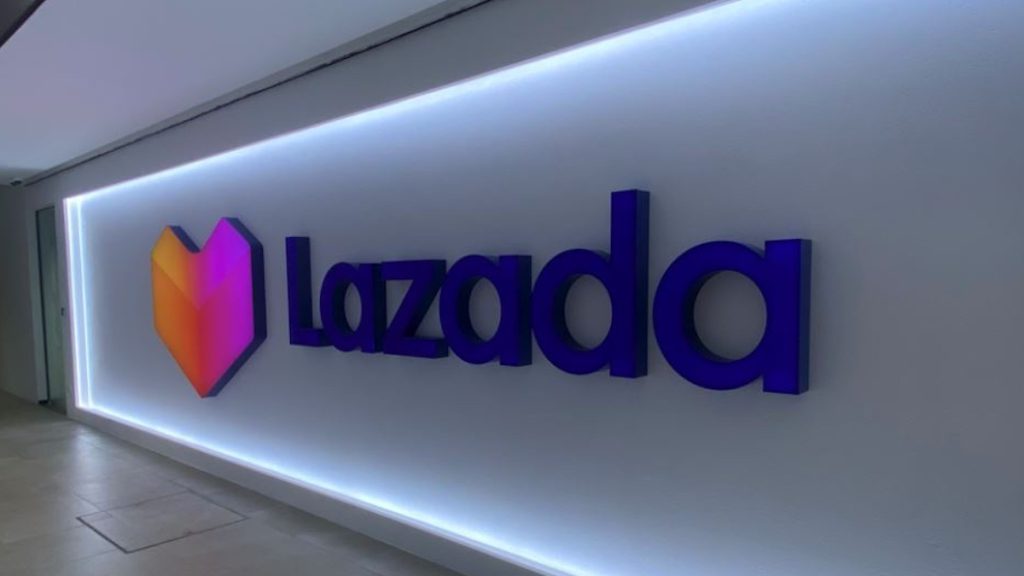
Lazada has finally settled the severance package it offered to former employees who were suddenly laid off in early January 2024, just in time to receive a $310 million capital infusion by parent company Alibaba.
You can read our coverage of the initial event, but to sum things up, Lazada initially offered its former staff a payoff equivalent to two weeks’ salary for every year of service, which is below industry norms.
According to MoM guidelines, the prevailing norm for unionised employees is one month’s salary for each year of service, and Lazada’s actions triggered the National Trade Union Congress (NTUC) and the Food, Drinks and Allied Workers Union (FDAWU) to step in and negotiate a new settlement.
Lazada will now pay eligible former employees an additional two weeks’ pay per year of service, (restoring the payout to the norm), while non-union former staff receive $1,200 for training support.
The conclusion to this saga comes amid reports that parent company Alibaba has injected another $310 million into Lazada, on top of the $2.4 billion that was invested in 2023.
Also Read: Lazada received extra $2.4 billion from Alibaba last year, so why is it axing so many jobs?
Feature image: Vulcan Post
No shade to foreign brands but this S’porean biz makes sunglasses that actually fit Asians

“Asian Fit. Won’t Bounce. Ultra Light.”
That’s the promise that Singaporean brand Sunday Shades assures customers. The idea might seem like a no-brainer since sunglasses are such a universal accessory, but it’s actually not as common as you’d think.
The international brands you usually think of like Ray-Ban and Oakley are made in Spain with European features in mind. The few others that do consider our Asian low nose bridges are few and far between.
And Kenneth Tan was getting pretty frustrated at having to fork out so much money for something that was ill-fitting. “I’ve always had problems finding a pair of sunglasses that fit my Asian features and won’t bounce when running.”

So together with his brother and athlete wife, Raymond and Dorothy, the three sought to rectify this overlooked problem with a bootstrapped capital of S$5,000.
For the sunny side of life
When Kenneth and Raymond exited the cloud company they started 16 years ago, they were itching for a new venture. The brothers had always been fascinated with starting businesses and often discussed their next adventure.
“Whatever it was, we agreed it wouldn’t be another tech company,” Kenneth joked. “We wanted to be in a business that lets us engage with happy clients.”
The idea for Sunday Shades fell on them during a family vacation when they were bouncing ideas off one another. It was only natural that they’d all come together to start the venture, particularly since the brothers had worked well previously.

Dorothy, on the other hand, had some creative ideas to spare. Her experience as an indoor volleyball player for the national team and later coach also came in handy (more on that later).
The concept was straightforward enough. All they had to do was create sunglasses that wouldn’t slide off or look ghastly when worn by the average Asian. Singapore being a tropical island meant that they could market it to anyone, because everyone would need a pair.
But that’s where the first trouble lies. “When we launched the site, nobody bought [it]. We learnt that when we try to market to everyone, we market to no one,” Kenneth shared.
The team then re-examined their strategy and opted to focus on a small niche that they could dominate—the athletic crowd.

Every shade has its month
As a way to relaunch the brand, Sunday Shades reached out to athletes, some of whom were Dorothy’s connections. A few pairs were seeded to them in return for honest feedback to improve the sunglasses.
For example, Kenneth told Sports Plus in 2022 that the rubberised coating used on most of its sunglasses came from an ultra-marathoner’s suggestion.
All the shades are designed in house. The trio are the only full-timers to date, though they’re supported by a group of contractors that help from logistics to marketing.
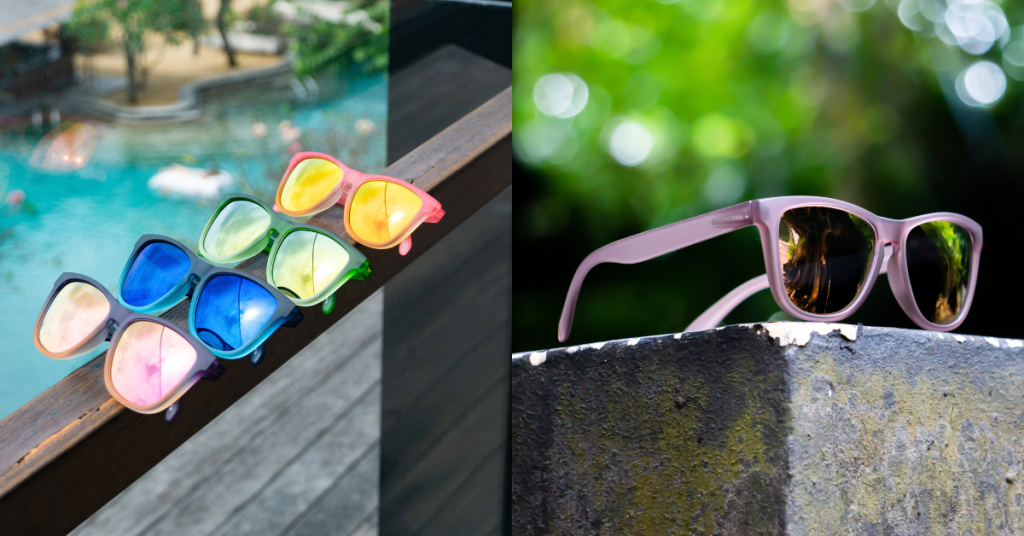
The production of their sunglasses are also outsourced to third-party manufacturers. “These are the very same factories that produce some well-known international brands,” Kenneth disclosed to us.
In regards to what changes were made to give it the Asian fit, he declined to share much. The only detail was that Sunday Shades raised the nose bridge and made fine adjustments to the frames for a snug fit.
Usually, they’d be on the lookout for eyewear with shapes that flattered most face types. Sketches are made and later shared with the production team to create prototypes. The team would create as many as 10 iterations before they settle on one.
Once satisfied, they’ll go into production with various colours. Some months there might be more but the general target is to release one colourway each month.

Working on being a “spectacle-uar” brand
At the moment, Sunday Shades offers five styles of sunglasses: Classic, Surge, Tempo, Cockpit, and Flare. The latter is its bestseller series and has a unique single piece of lens.
Price-wise, the co-founders opted to keep it within the affordable range of S$49 to S$59.
Customers can opt to purchase them online through the brand’s website. However, if you’re someone who prefers trying them on first, you could head down to Thee Bold Stories or its counter at Central, Clarke Quay.

Sunday Shades has expanded its offline business internationally as well. Indonesian consumers can find their shades at WearInAsia and HLSPORT’s retail outlets, and soon Tunjungan Plaza. This appears to be the approach they’re taking to grow and scale up moving forward.
All that said, Kenneth confided that it hasn’t been easy managing the logistics and inventory. Cash flow has to be managed carefully, and as such, not much stock is kept. “In months where demand is higher, we often run out of SKUs to sell.”
“We are now much better at predicting demand, and although still not perfect in managing inventory, we are getting there.”
In terms of conquering the market, there’s still many steps before the team gets there. But seeing as how they’re filling an important market gap, it’s not a question of whether they’ll get there, rather when?

Also Read: Net zero explained: Why Amazon, Microsoft, & M’sia itself are pledging to be carbon neutral
Featured Image Credit: Sunday Shades
Malaysia’s quest for 5 unicorns by 2025 is now in the hands of MDEC’s game plan
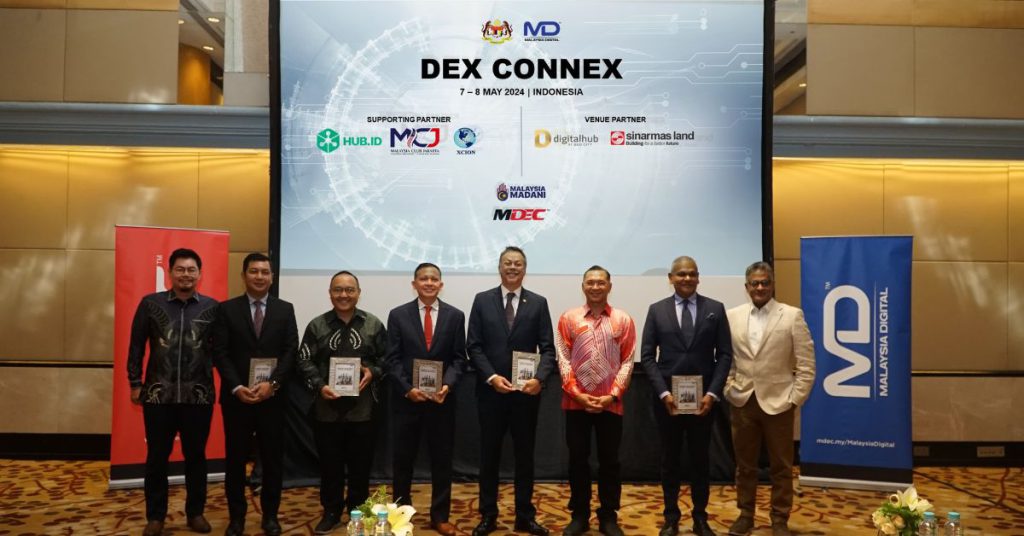
[This is a sponsored article with MDEC.]
It’s been known that Malaysia has set a goal to identify five unicorns by 2025, which was announced in 2021, in line with the Malaysia Digital Economy Blueprint or MyDIGITAL.
In a promising turn of events, the nation witnessed the rise of Carsome announced as the first unicorn within the same year.
Establishing unicorns requires meticulous planning and sustained efforts. With less than two years to achieve this ambitious goal, Malaysia Digital Economy Corporation (MDEC), under the Ministry of Digital, is actively laying the groundwork to ensure this becomes a reality.
The drive to achieve this comes from the top with MDEC CEO, Ts. Mahadhir Aziz.
He emphasised, “Through the Malaysia Digital (MD) national strategic initiative, our aim is to revolutionise Malaysia’s digital capabilities, harness technology and innovation to fuel sustainable economic growth, catalyse digital adoption across industries, and firmly establish Malaysia as the digital hub of ASEAN.”
MDEC assumes an active role in spearheading initiatives that can champion the support of high-growth startups, forging strategic partnerships, and implementing pioneering programmes.
This concerted effort creates an environment conducive for businesses to expand their digital exports, aimed at propelling Malaysia’s economic growth to new heights. Guided by the MD vision, MDEC has rolled out several strategies to do so.
Among them is the Founders Centre of Excellence (FOX), which is dedicated to cultivating high-potential startups. It will focus on equipping these companies with the tools and knowledge they need to scale globally and achieve technological innovation.
Getting the home base right
The FOX programme aims to identify and nurture high-growth technology companies, amplifying their potential to become global tech companies. By fostering a robust support network and providing targeted resources, FOX helps these organisations solidify their business fundamentals and strategic capabilities.

Currently, there are at least 35 Malaysian-based companies under the initiative, with a few showing strong unicorn potential. MDEC is keeping their names under wraps, but it is suggested that among them consist of leading companies in fintech, proptech, and recommerce verticals.
According to MDEC, these companies under FOX were chosen based on their business model’s scalability, revenue curve, and having a minimum 20% three-year compound annual growth rate (CAGR).
Within the FOX programme, one key focus area is the refinement of companies’ customer acquisition strategies. The programme will emphasise interest in models that provide stickiness, aiming for reduced churn rates and minimised acquisition expenses.
MDEC stated that the combined valuation of the top 10 startups under the FOX portfolio of 35 companies is estimated to be US$4 billion.
While each of these startups is still on its journey to reach a valuation of US$1 billion, it is crucial to recognise that the true value of a business extends beyond mere numbers.
What determines the long-term success and market resilience of a company is its underlying fundamentals, and its ability to innovate and adapt.
While the FOX programme is designed to accelerate the growth and valuation of the participating startups, MDEC will ensure that these companies hold strong business fundamentals and are strategically positioned for scaling up.
Ultimately, this is in light of the startups’ attainment of IPO and unicorn status.
For instance, participants in the FOX programme can gain mentorship access from industry leaders, who are specialised in training companies in key business areas.
FOX’s participants will also be exposed to networking opportunities with potential investors and partners, which are invaluable resources as they prepare for future milestones.
This is important, because while rapid company growth may seem impressive, one observation stands out: tech companies often struggle to establish essential internal structures amidst their swift expansion. It is a trend that MDEC has observed over its 28 operational years.
MDEC believes that by avoiding pitfalls like hasty reorganisation or restructuring, which can derail a company’s progress, MDEC FOX can help ensure that these startups not only grow in valuation but also strengthen their operational health. This positioning sets them up for enduring success.
Companies participating in the FOX initiative have the opportunity to access a broad range of consulting and advisory services from MDEC’s partnered firms such as Ernst & Young (EY), Klynveld Peat Marwick Goerdeler (KPMG), Korn Ferry, and Brand Soul.
This way, MDEC can ensure that startups receive tailored support, enhancing their strategic capabilities and growth potential.
The consulting companies will advise startups on areas such as talent management, organisational structure, branding, and sustainable business growth strategies.
Exposing them to the world
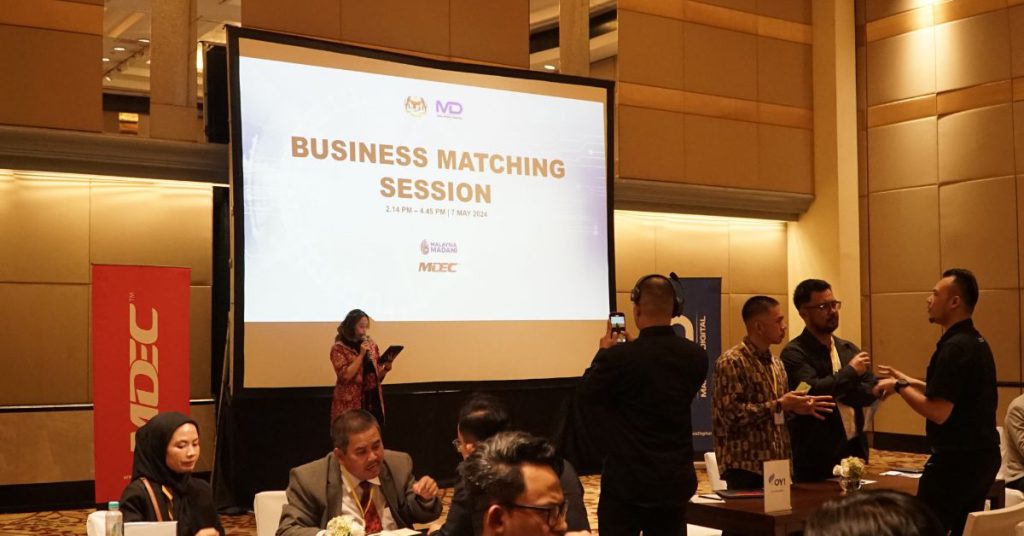
Additionally, the high-growth tech startups will also be put through networking and business matching opportunities via DEX CONNEX.
DEX CONNEX is a platform initiated by the Digital Exports Division (DEX) of MDEC to expand the revenue footprint of Malaysian tech companies into regional and global markets.
MDEC collaborates extensively with the Malaysia External Trade Development Corporation (MATRADE) and the Ministry of Foreign Affairs via the various Malaysian Embassies to enhance trade opportunities for local tech companies on a global scale.
This effort is bolstered by close partnerships with Malaysian embassies around the region. It includes the engagement of ambassadors, high commissioners, and trade commissioners.
Key international collaborations include associations from Thailand, Australia, Japan, Philippines, Vietnam, Indonesia, and Taiwan.
Additionally, MDEC actively collaborates with Malaysian business chambers in various countries to further strengthen and expand the network for Malaysian tech enterprises. It aims to foster robust global connections that facilitate their international growth and visibility.
This initiative is crucial for the nation, as global companies drive innovation, provide jobs, nurture talent, attract investment, contribute taxes, and strengthen the overall ecosystem.
But are unicorns still worth chasing?
There has been plenty of discourse in the startup ecosystem criticising the unicorn agenda, as it promotes heightened valuations from venture capitals, and the companies themselves take a back seat in attaining profitability.
Hence, why is MDEC so fixated on growing unicorns?
MDEC acknowledged that the ecosystem’s concerns are valid, as we have all seen the fallout from unicorns in other countries when valuations are pushed beyond realistic limits, without supporting fundamentals.
Investors have become savvier about investing in startups with greater sustainability in the long run. Ultimately, business fundamentals are crucial, especially in a challenging economic climate.
This potential underscores the critical role of investors who are equipped and ready to support these ventures. Programmes like FOX are instrumental in preparing these startups, making them viable candidates for substantial investments.
The value of pursuing unicorns extends beyond their financial worth, according to MDEC.
As beacons of success, unicorns serve as lighthouses within the tech ecosystem, inspiring other entrepreneurs to elevate their ambitions. The success stories of these unicorns play a crucial role in galvanising the entire startup ecosystem, making it more robust and resilient.
MDEC’s FOX programme not only accelerates the journey towards such milestones but also cultivates well-rounded companies with strong fundamentals, enriching the ecosystem’s resilience.
MDEC prioritises the sustainability of businesses over rapid expansion, and that is exactly what the FOX and DEX agendas aim to achieve.
- MDEC offers various programmes for MD status companies. Apply for Malaysia Digital status here.
- Read other articles we’ve written about unicorns here.
Also Read: Meet 2 companies keeping Malaysia on the world map as a leading semiconductor hub
Featured Image Credit: MDEC
This S’porean mother-son duo left corporate jobs to open a coffee shop together in Chinatown
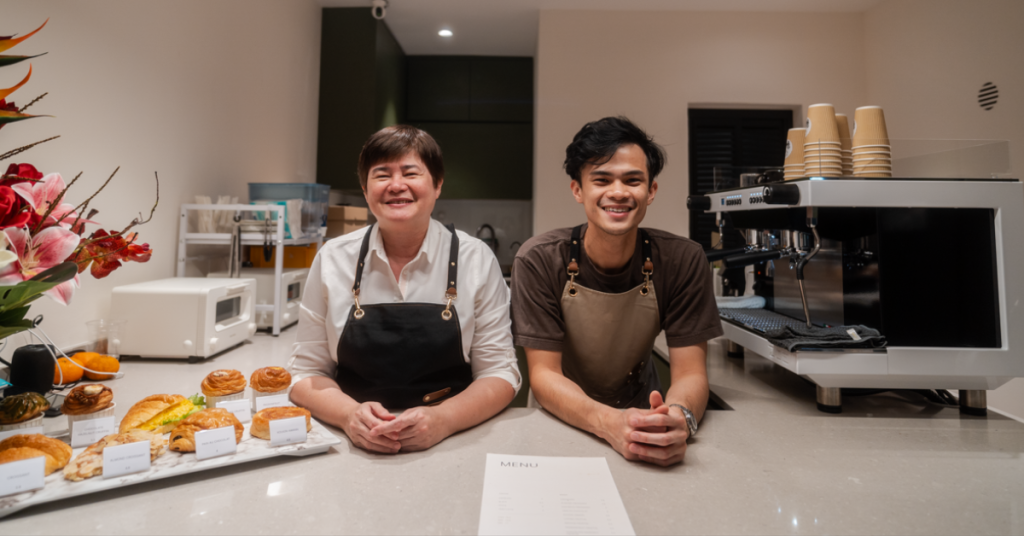
“After being let go, I was a bit bummed out. It was something you always see in the news but I never believed that something like that could happen to me,” Esmond Toon shared.
He was only a couple months into his employment at a new company when it happened. Prior to that, he was a fresh graduate that just began work as an Application Consultant in the fintech industry.
Who knew he’d experience being let go within just two years of his professional career?
It was a mere coincidence that he had a couple of overseas vacations planned in the next few months. So off he went to rest, recuperate, and plan his next steps to bounce back.
But instead of searching for a new white-collared job, he returned with a bolder idea—to start his own coffee shop. And as fate would have it, his mum, Mary Chan, was pretty tired of the corporate world too and decided to join his venture.
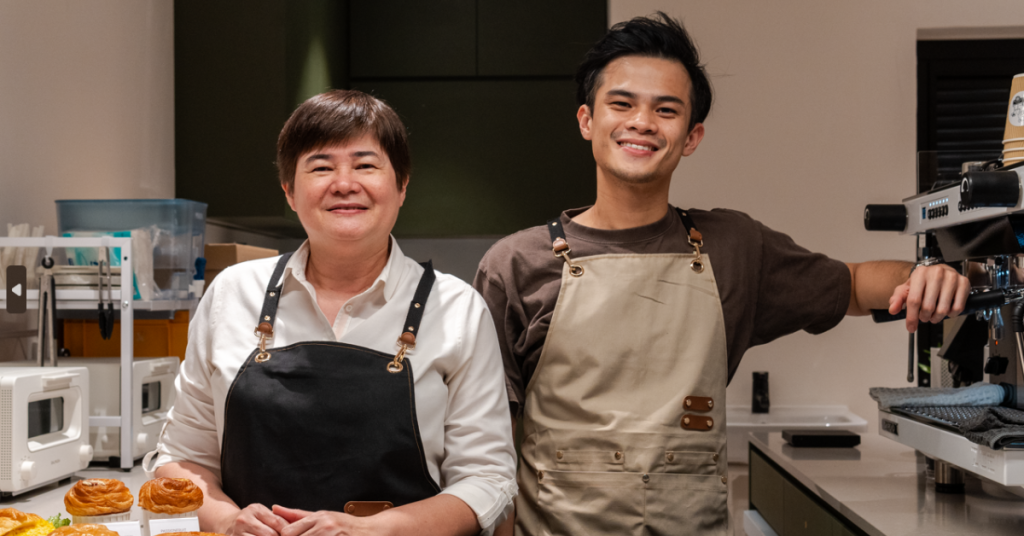
That’s how Bullock Cart Coffee was founded.
From hobby to full-time career
Speaking candidly, Esmond explained that opening the coffee shop wasn’t a whimsical decision.
While most people were picking up baking during pandemic lockdowns, he picked up coffee-making. It was something he enjoyed doing and actually took time to learn the craft. He had even invested in a coffee machine at home and took classes here and there to improve.
“I always had this dream of mine to have a small coffee bar especially after getting into the coffee hobby,” he stated.
Mary, on the other hand, had been a corporate employee for almost 40 years at that point. She already had plans of resigning when Esmond came up with the cafe idea. It was this push that motivated her to leave and try something new.
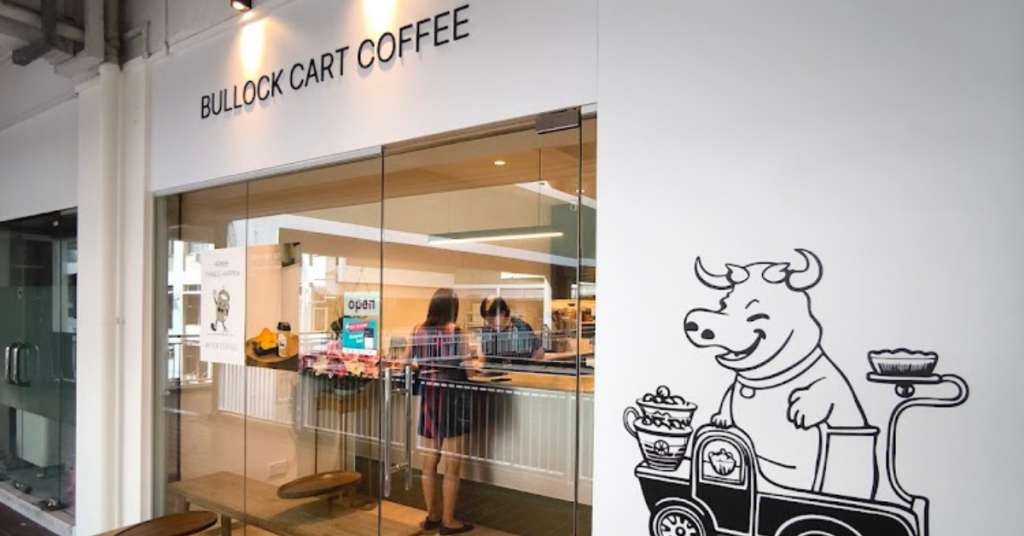
Within a few months, the mother-son duo scouted and secured the store’s location at Hong Lim Complex, Chinatown. Being within the area meant they could target the office crowd more easily.
Having worked close by previously, Esmond was more than familiar with how dependent the crowd there was on caffeine. The smaller space for the shop was also a deliberate decision as it suited their grab-and-go concept.
In regards to the name, well, he jokingly shared that it came down to his “horrible” Mandarin.
“The only place in Singapore that I know the Mandarin name of is Chinatown, also called ‘Bullock Cart Water’ in Mandarin.”
He replaced the word ‘water’ for ‘coffee’, and the name just stuck.
New year, new venture
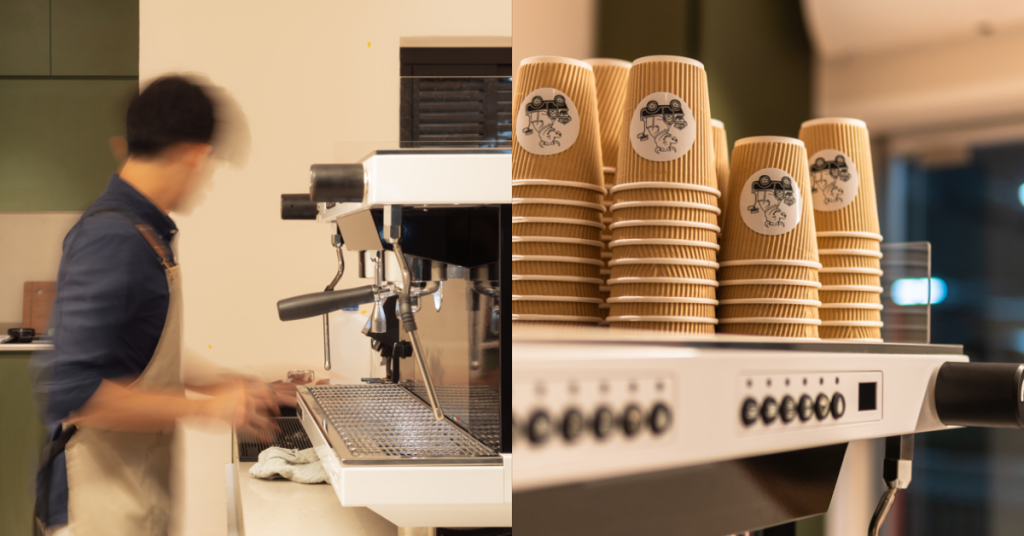
The coffee shop officially opened on February 6 this year, with only Esmond and Mary helming the space.
If you visit earlier than its opening hours of 8AM (on weekdays), you’ll find Mary dialling in the coffee. This was a process Esmond would repeat at the beginning as the shots were either too acidic or too bitter. But she’s a fast learner and picked up the skill after her first month on the job.
Dictionary time: Dialling in coffee refers to the daily ritual of calibrating your coffee equipment and adjusting brewing parameters to achieve that perfect espresso.
Source: North Star Coffee Roasters
Described as a quaint, hole-in-a-wall place, Bullock Cart Coffee doesn’t serve fancy drinks the way a full-fledged cafe does. They keep it simple by providing the usual black and white coffees along with Taro Latte, a house specialty.
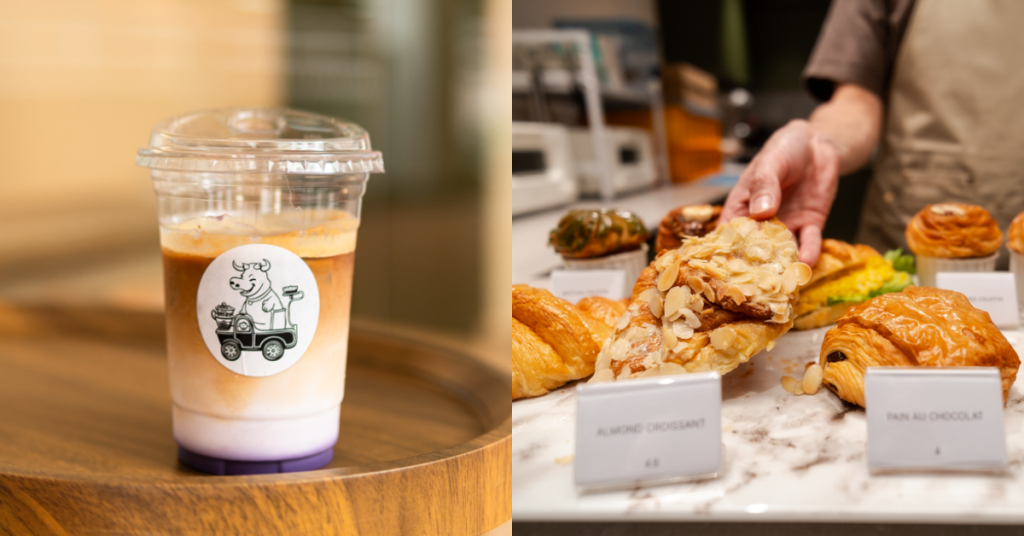
Those looking for something more refreshing to beat the heat could opt for Italian soda drinks.
Esmond and Mary stay true to their ambition of being just a coffee shop by not serving any hot food. In fact, they have no plans of expanding the menu to include anything that involves cooking.
But if you are feeling peckish, there are pastries from Bread Yard, a local artisan bakery and cafe. Those looking for something heavier could try their Egg Mayo Croissant.
Chatting with customers over coffee
On average, Bullock Cart Coffee brews up to 80 cups of coffee on weekdays. Business tends to be a tad slower on non-working days without the Central Business District lunch crowd.
This would be a good time period to visit if you’re looking for a short break from the hustle and bustle of the city. Regardless of your intention, Esmond and Mary’s aim is to make customers feel at home and get to know them personally.
“We ask them about their day, what they did during the weekends,” he explained. “I would say it’s akin to an old friend stepping into my living room and having a chat over a cup of coffee.”
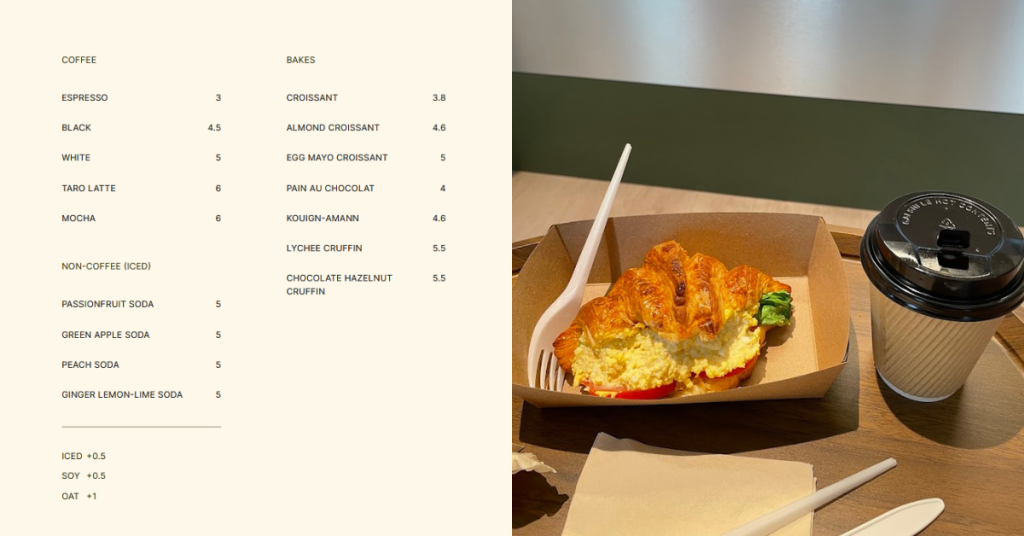
This approach in building authentic relationships and connections with customers seems to be working too. The 27-year-old disclosed they’ve been steadily building up a loyal customer following, much to their delight.
So if you’re looking to make new friends, this coffee shop might be a good place to start. But do note that there is a limited seating capacity of up to six people.
Despite being still relatively new, Esmond and Mary have big ambitions for Bullock Cart Coffee. “Ultimately our dream is that we would like ‘Bullock’ to be a verb, in a sense that people will say ‘Let’s go to Bullock’ when they want to grab coffee,” he said.
The plan to achieve this is by opening up more stores of a similar size and growing their numbers from there. Esmond also didn’t rule out returning to the work force. Should the right opportunity present itself, he’d be open to running Bullock Cart Coffee on the side, while Mary handles the day-to-day operations.
In the meantime, they’ll be working on expanding their menu to include more exciting beverages for the daily grinders.
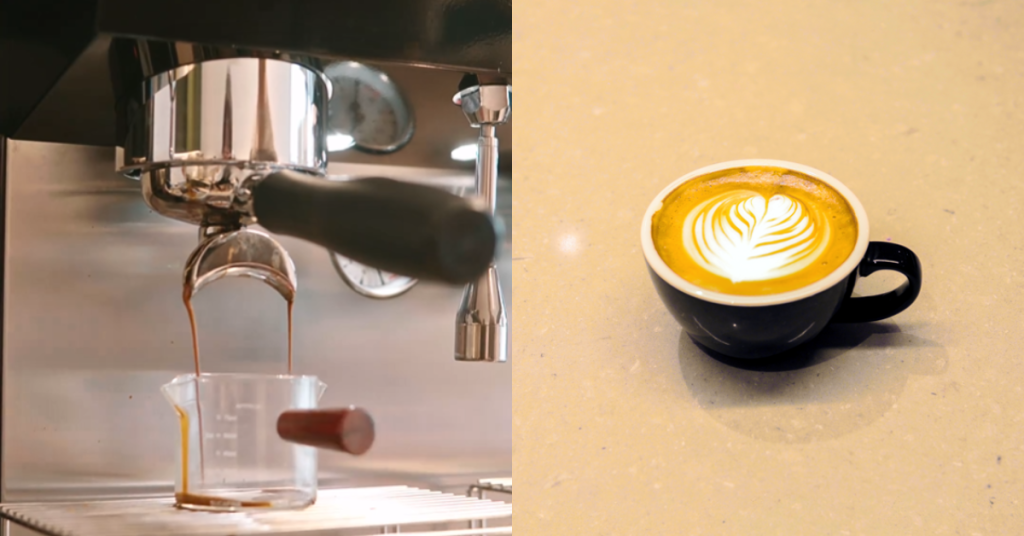
Also Read: Net zero explained: Why Amazon, Microsoft, & M’sia itself are pledging to be carbon neutral
Featured Image Credit: Bullock Cart Coffee
New data shows Singaporeans enjoy the most affordable apartments in the entire Asia-Pacific

Disclaimer: Any opinions expressed below belong solely to the author.
It seems like there isn’t a day when a news story covering another million-dollar HDB transaction is making headlines in Singapore. The reality is, however, that these prices are reached in just 1 to 2 per cent of all HDB transactions each year.
These are usually the largest apartments, located in highly desirable buildings and neighbourhoods.
However, stories about these expensive apartments are enough to skew the public perception of housing affordability today and in the future.
While the government has tried to explain it, providing figures to prove its case, many people still distrust it. So, how about we introduce a 3rd party, one which regularly reviews housing prices across the entire Asia-Pacific? Urban Land Institute.
ULI is a global nonprofit research organisation founded in Washington, DC, in 1936, currently with offices in London and Hong Kong as well, and it has just released its annual Asia-Pacific Home Attainability Index report, covering 48 major cities in 11 countries in the region.
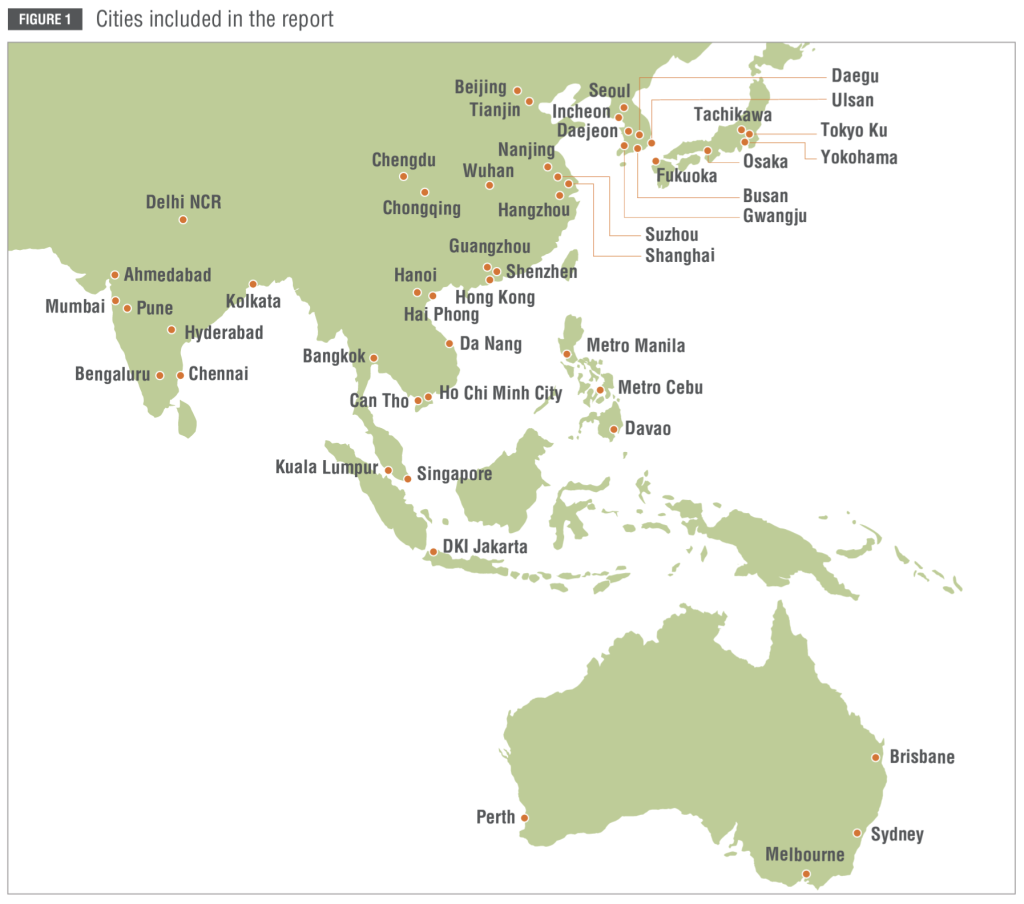
Cheap like Singapore
The report specifically focuses on the “attainability” of housing in each city, which is estimated by two simple metrics:
- Median home price to median annual household income (ideally less than 5 times)
- Median monthly rent to median monthly household income (ideally less than 30%)
Let’s just cut to the chase here, and cite the conclusion of the report verbatim:
Singapore continues to have the highest home attainability in the region with median price of Housing Development Board (HDB) units at less than 5 times median household income. Developed by the government and sold to individual Singaporeans, HDB units represent nearly 90% of the total housing stock in Singapore. Shenzhen continues to have the highest ratio of median home price relative to median annual household income at 32 times, followed by Beijing at 28 and then Metro Manila, Ho Chi Minh City, and Hong Kong SAR at around 25.
Urban Land Institute, 2024
With a ratio of 13.5, even the local private market—typically seen as expensive and inaccessible to most—doesn’t look too bad in comparison. The gap is so massive that if HDB disappeared overnight and the entire market was privatised, Singaporeans would still be nearly twice better off than Hongkongers.
Among Tier 1 cities listed in the report Singapore leads Melbourne, Kuala Lumpur and, perhaps surprisingly, Sydney.
| City | Country | Median annual income to apartment price ratio |
| Singapore (HDB) | Singapore | 4.7 |
| Melbourne | Australia | 4.9 |
| Kuala Lumpur | Malaysia | 5.5 |
| Sydney | Australia | 6.4 |
| Delhi | India | 7.5 |
| Osaka | Japan | 8.7 |
| Jakarta | Indonesia | 8.8 |
| Mumbai | India | 11.7 |
| Singapore (Private) | Singapore | 13.5 |
| Tokyo | Japan | 14.3 |
| Seoul | South Korea | 17.8 |
| Guangzhou | China | 20.4 |
| Hanoi | Vietnam | 20.8 |
| Bangkok | Thailand | 21.0 |
| Shanghai | China | 23.6 |
| Manila | Philippines | 25.0 |
| Ho Chi Minh City | Vietnam | 25.3 |
| Beijing | China | 28.6 |
| Shenzhen | China | 32.3 |
But even compared to Tier 2 locations — smaller, less populous urban areas — the city-state would come in second, marginally pipped to the post by Perth with its ratio of apartment prices to median annual income at 3.9 compared to Singapore’s HDB’s 4.7.
And, let’s not forget that Australians have no shortage of land, which naturally keeps property prices down, especially given their relatively small population.
Cities grappling with similarly limited territory and high population density — like Tokyo, Osaka, Yokohama, Seoul – are about two to three times more expensive.
Spacious like Singapore
Speaking of limited space, it doesn’t seem to be a problem for the Lion City, as the median size of HDB apartments sold is close to 100 square metres (and 112 in the private market). That is twice the average of just 50 sqm. in Hong Kong or 54 in Osaka, and considerably more than 60 to 70 sqm. in other Japanese, Chinese or Korean cities.
| City | Country | Median apartment size (sqm of usable area) |
| Hong Kong | China / SAR | 50 |
| Osaka | Japan | 54 |
| Bangkok | Thailand | 55 |
| Shenzhen | China | 58 |
| Guangzhou | China | 58 |
| Shanghai | China | 59 |
| Beijing | China | 61 |
| Tokyo | Japan | 63 |
| Yokohama | Japan | 70 |
| Seoul | South Korea | 73 |
| Incheon | South Korea | 73 |
| Busan | South Korea | 75 |
| Kuala Lumpur | Malaysia | 98 |
| Singapore (HDB) | Singapore | 98 |
| Singapore (Private) | Singapore | 112 |
| Sydney | Australia | 101 |
| Brisbane | Australia | 113 |
| Perth | Australia | 120 |
| Melbourne | Australia | 125 |
Curiously, it is only marginally behind the averages for Sydney, reporting 101 sqm. and a just bit more compared to Brisbane, Perth or Melbourne, which fall between 110 and 125, and are the largest in APAC.
Say what you will, but it does seem like a bit of a miracle that a public programme like HDB has achieved the most affordable and, at the same time, some of the most spacious apartments in the entire region, on a tiny, land-scarce island of 6 million people.
To save their batik souvenir shop from dying, this M’sian biz started offering experiences
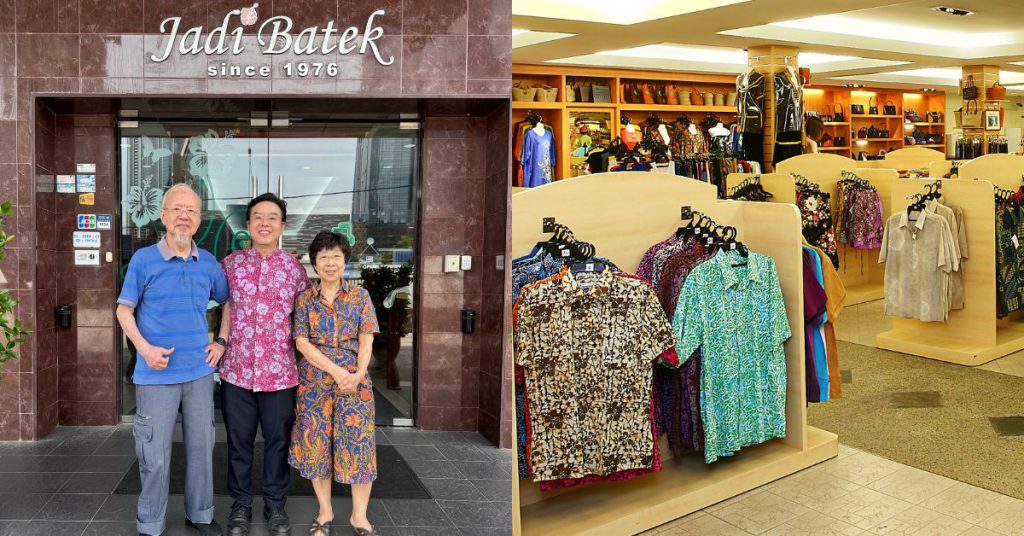
Tucked away in a cosy corner in Jalan Inai, KL, one family-owned business has been weaving stories and preserving heritage for decades, evolving with time yet staying true to its roots.
The journey of Jadi Batek is a tale of heritage passed down through generations, entwined with a modern entrepreneurial spirit.
It all began in the 1970s when Yong Jo, the father of the current owner, Colin Yong, embarked on a humble journey as a salesperson at Jadi Batek. In 1976, Colin’s father took over the business from his boss. Little did he know that this would mark the beginning of a legacy.
After years spent in the corporate world, navigating the intricate realms of commerce in Japan and Thailand, Colin found himself at a crossroads when his parents offered him the opportunity to take over Jadi Batek.
“I saw the potential of the batik and tourism business in KL and thought it may be a waste to close it down or sell it to others. Thus, I decided to take the offer from my parents to buy over the business.”
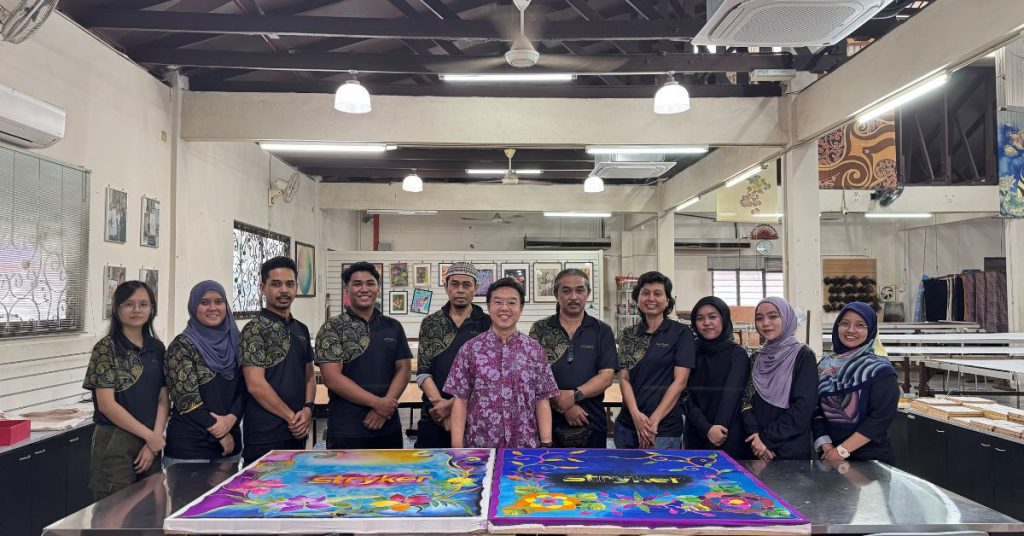
“It was not a free handover from my parents but with a loan to pay back,” he said.
That was because Colin’s father wanted him to perceive the business as his own startup venture, fostering a sense of ownership and pride.
Adapting to market shifts
It wasn’t just a business transaction; it was a leap of faith and a chance to honour tradition while embracing innovation.
“When I joined Jadi Batek in 1999, it was a souvenir shop catering mainly to tour buses,” Colin reminisced.

However, with changing market dynamics and evolving consumer preferences, he recognised the need for adaptation.
“Young tourists said they don’t want to join tours as they prefer to travel by themselves. The tourists were also not as keen on buying souvenirs that much. They wanted experiences, something different.”
“So, I thought, why not give them what they want?” he continued.
Thus began a new chapter for Jadi Batek—one defined by batik tours, classes, and a renewed focus on experiential tourism.
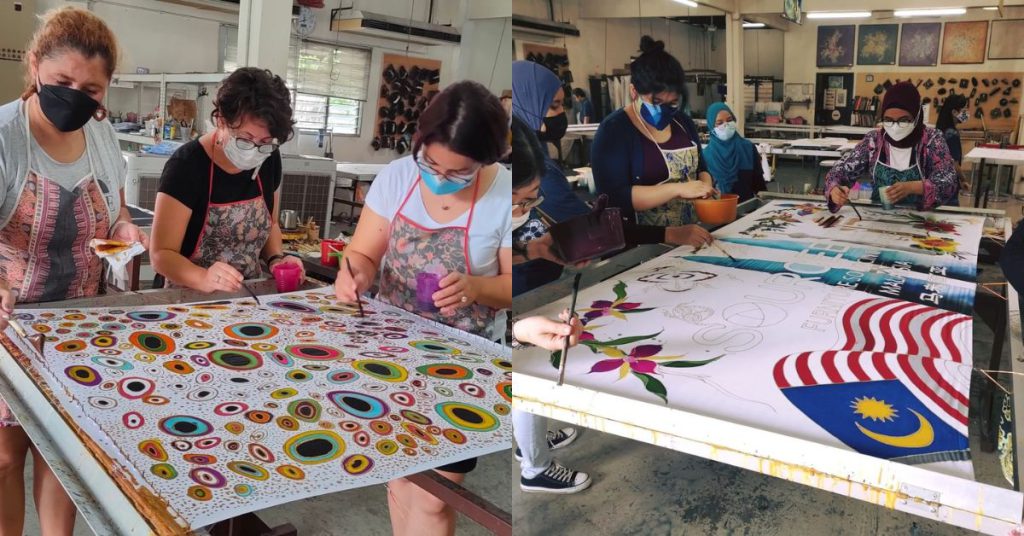
As a budding entrepreneur himself, he faced his fair share of challenges during the transition period.
Relocating from Jalan Sultan Ismail to Jalan Inai in 2003 brought its own set of hurdles, with a loss of walk-in customers necessitating innovative marketing strategies.
From traditional advertisements in maps and magazines to harnessing the power of social media, Colin ensured that Jadi Batek remained not just relevant but thriving in the digital age.
Preserving tradition & embracing change
According to Colin, Jadi Batek is all about quality and making sure their customers are happy. They put a lot of care into crafting their batik apparel and the artwork adorning the walls of the place. The goal is for customers really feel the Malaysian vibe in every piece they offer.
Batik items on sale here include lengths of batik dress-making material, ready-to-wear apparel such as dresses, blouses, cheongsams, scarves, kaftans, men’s shirts, children’s clothing, tablecloths, coasters, wall hangings, and other batik artworks.
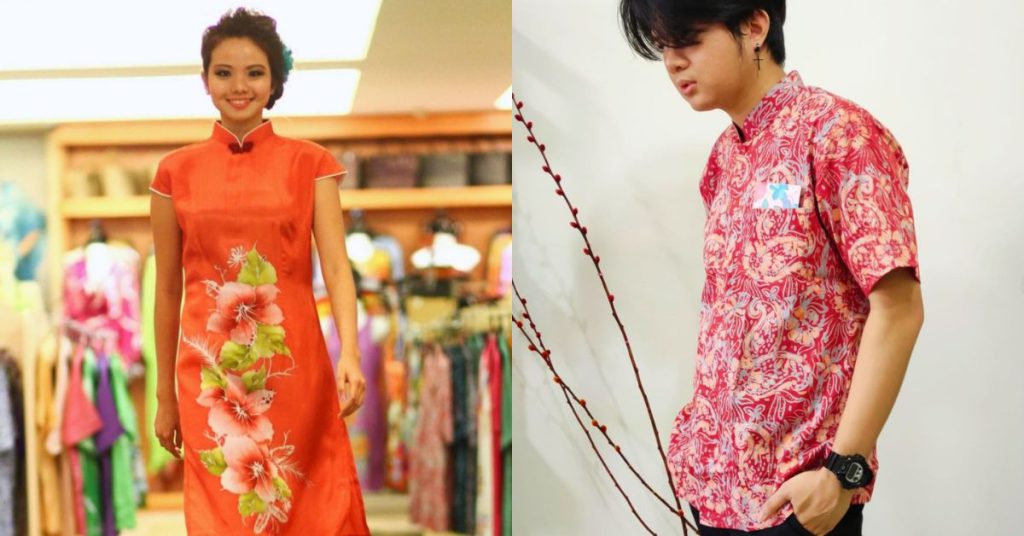
Colin’s vision isn’t just about making money; he wants to spread the word about Malaysian batik everywhere.
“In multi-racial countries like Malaysia, batik serves as a unifying force,” Colin asserted.
So at Jadi Batek, they’ve made sure they maintain a diverse team, like a little community where different cultures come together and celebrate what makes Malaysia unique.
From hand-drawn masterpieces to block-printed marvels, each creation by the team is a labour of love, preserving a heritage that transcends time.
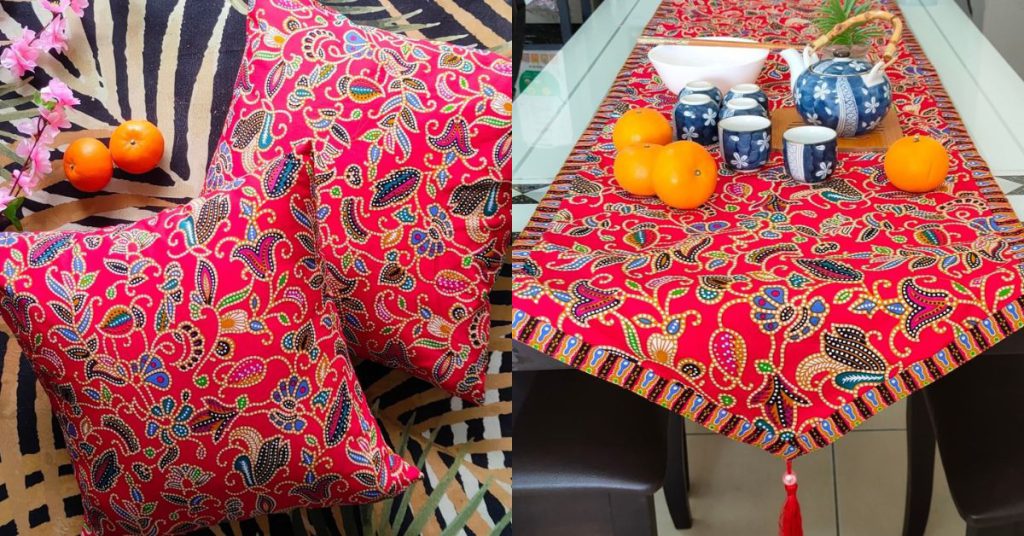
Wan Jafnan Wan Ariffin, the chief artist at Jadi Batek, exemplifies this dedication. With nearly two decades of experience, Wan Jafnan leads his team with passion and skill, ensuring that every batik piece tells a story of its own.
In the age of fast fashion and machine-printed replicas, Jadi Batek stays true to the real deal. They’re all about authenticity and standing firm amidst the flood of replicas.
Yet, the scarcity of skilled workers and competition from mass-produced alternatives loom on the horizon, requiring constant innovation and education.
Nevertheless, Colin’s vision for Jadi Batek remains unwavering.
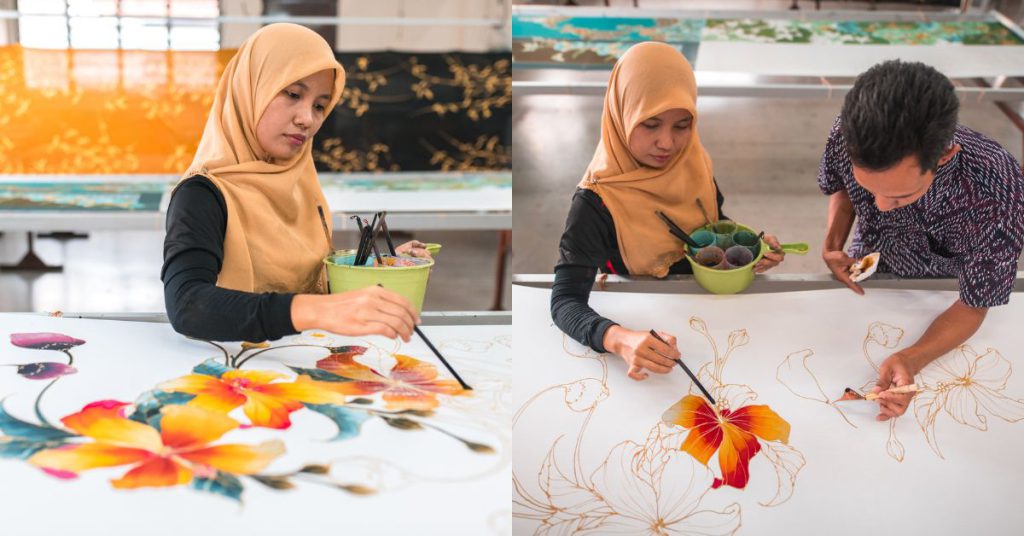
With plans to expand across the Klang Valley and establish batik centres beyond Kuala Lumpur, his journey continues to unfold, guided by a commitment to tradition, craftsmanship, and the enduring spirit of Malaysian batik.
In every stitch, in every brushstroke, lies a story waiting to be told—a story of tradition, reinvented for the modern world.
- You can learn more about their business here.
- Read other articles we’ve written about Malaysian startups here.
Also Read: 3 GenAI use cases with the potential to take off in M’sia, based on global examples
Featured Image Credit: Jadi Batek

